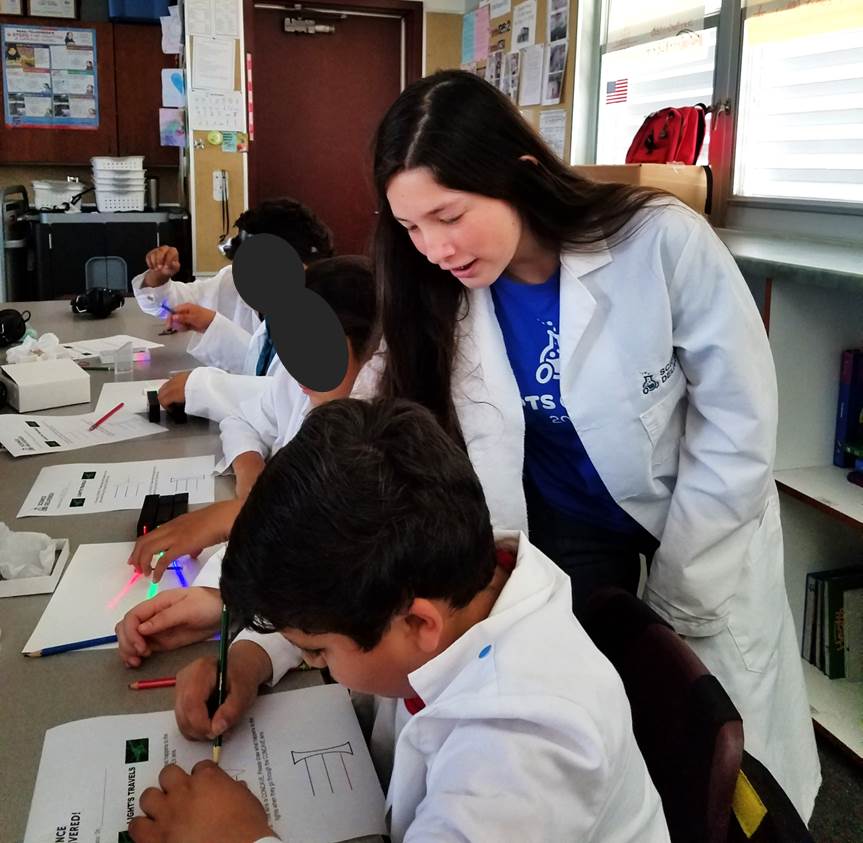The following blog post was written by a high school student in Science Delivered’s CAPTS program, Fatima Perez CAPTS stands for Communication and Presentation Through Science and is an after-school program where teens learn to teach a science lab to elementary school students. During this program they learn science content, communication skills, presentation skills, classroom management and more. At the conclusion of the program they teach in a 4th or 5th grade classroom. Fatima was a part of our pilot program in 2017 and served as a Teaching Assistant for our Spring 2018 program at Hoover High School in City Heights.
Science Delivered runs CAPTS under the umbrella of UCSD’s Upward Bound Math & Science.
From Fatima:
I was introduced to Science Delivered through the coordinator at my school who works for Upward Bound Math & Science, a college preparation program, Marcus Thompson. Marcus explained to a few of his students about Science Delivered and its dedication to science education for younger students and how we could work with the non-profit. When I learned that Science Delivered did in-class lab presentations for elementary schoolers I was immediately interested. I didn’t have much experience with younger children but being a nerd for all things science, I knew I would enjoy it.
Fatima presenting a chemistry demo in front of a 5th grade class. Fellow CAPTS student Karina is in the background.
I wasn’t sure what I was expecting, but the amount of effort needed to be put into teaching surprised me. The easiest part of the experience was learning how to do the experiments in the labs, which in my case was Chemistry: What’s Your Reaction? Pouring baking soda into a bottle with vinegar to produce a chemical reaction was fairly simple, but explaining the chemical reaction to elementary schoolers was challenging. I had to learn these big scientific concepts like endothermic and exothermic reactions and break them down into smaller, intelligible pieces for the students. There were many things to take into consideration like my body language, speaking speed, and being able to answer questions to make sure that the concepts stuck with kids.
It took a few months of preparing before the day to present finally came. We had a lab scheduled for a 5th grade class at America’s Finest Charter School. The day before, I was a nervous wreck, worrying about forgetting vital information or that the students would be unimpressed and uninterested. Fortunately, I ended up having no reason to worry. I knew exactly what to say while presenting thanks to the hours spent practicing, and the students were fascinated by the experiments. They were even surprised to find out I was actually a high school student and some asked if we would return the next school year!
The following summer, I volunteered at the Fleet Science Center in Balboa Park as a camp counselor for their summer science camps. Even though the overall goal in those camps was the same as our labs (providing young students with enriching science experiments) working with the science camps was also very different. Each camp was a week long and each day we’d get new experiments. We’d have to learn to set the experiments, learn how do them ourselves, and how to explain them to the campers, in the time before they arrived.
Fatima working with a 4th grade student at Cherokee Point Elementary while teaching "Light's Travels"
The young age of the kids in my camp group really gave me better insight as to why the lab I taught was for 4-5th graders and not 1st graders. A very memorable moment for me was in the “Chemistry in the Kitchen” camp. The camp counselors were given an experiment that was very similar to the one I had done with CAPTS, using citric acid and baking soda to make an endothermic reaction. I tried and tried to explain the reaction to the campers, rephrasing my words, breaking the concept down even further, but the 6-year-olds simply were not grasping why the mixture was getting cold. Fortunately, they still saw the experiment as the coolest thing they had ever witnessed, and the goal of getting them to start thinking more scientifically was being achieved.
As the next school year began along with the second year of CAPTS, I became a Teaching Assistant in the program. New CAPTS Captains were recruited as the program expanded and I helped them using the experience that I had from the previous year. I helped in the preparation of their own labs by giving them advice on their presentation style and helped with understanding of the science behind the labs. I also occasionally helped with the organizing of the captains to make sure everyone knew what they needed to do for assignments or preparation.
These past two years in CAPTS have been full of work, but it has been more than worth it. It has been an incredible learning experience for myself, and I strongly believe, for the elementary students we presented to as well. Seeing the faces of students light up when they understand something that I myself taught them is incredible. This is especially true since I am teaching about a field that I am passionate about. The incredible insights and observations the students have during the labs makes me excited about helping spark their interest in a field filled with opportunity for them.



